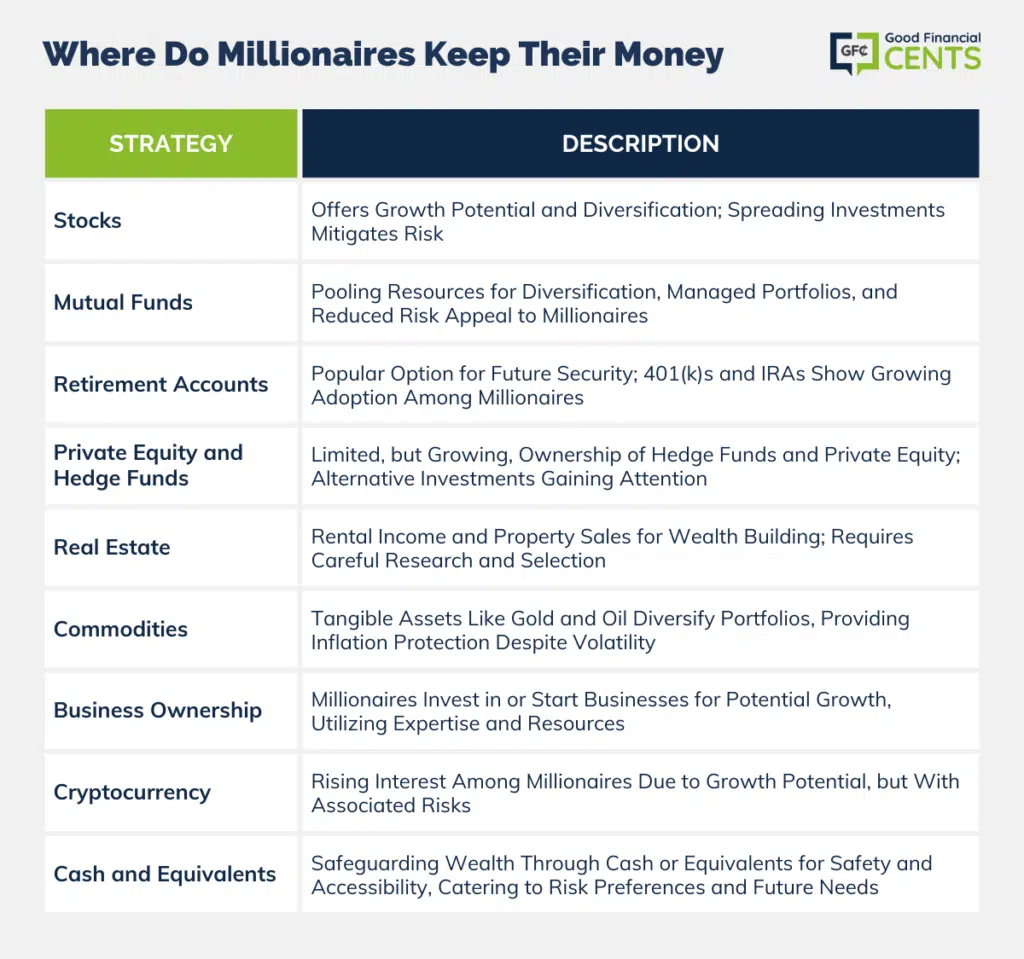Ever wondered, Where millionaires keep their money? There are several different ways for millionaires to keep their money. Some will want to preserve the wealth they built in safe and secure investments such as high-yield savings and CD’s. Others like to see their wealth compound so they’ll invest it.
According to a Private Bank Study by Bank of America a common place for millionaires to keep their money is in stocks, mutual funds, and retirement accounts with over 55% of their wealth held in these investments.
However, there are also a significant number of millionaires who keep their money in real estate.
The most important thing is to diversify your investments and create a well-rounded portfolio. This will help you protect your wealth and grow it over time. Here are some of the most popular places for millionaires to keep their money:
Table of Contents
1. Stocks
Millionaires and billionaires often want to build a diverse investment portfolio in order to grow their wealth and learn new things. Investing in stocks is one way to do this, but it is important to assess all options and understand the risks before making a decision.
When you invest, one of the smartest things you can do is to spread your money around – Diversify! That way, if one investment tanks, you’ve got others to fall back on.
For example, many millionaires invest in stocks. Some people choose to invest a large percentage of their assets in stocks and funds, but others only invest a small amount. Over time, the stock market has proven to be a great place to grow your wealth.
Of course, there are always ups and downs, and you could lose money in the short term. But if you’re patient and stick with it for the long haul, stocks have the potential to make you a lot of money.
2. Mutual Funds

Mutual funds are another popular investment among millionaires. Why? because they’re a great way to diversify your portfolio and reduce risk. When you invest in a mutual fund, you’re pooling your money with other investors.
This means you’re spreading out your risk, which can help you weather the ups and downs of the market better. Plus, mutual funds are managed by professionals who know what they’re doing. So if you don’t have the time or expertise to pick individual stocks, mutual funds can be a smart choice.
Some of the more popular mutual fund companies for millionaires include Fidelity Investments, Charles Schwab, and Vanguard Group. These companies offer a variety of mutual funds that cater to high-net-worth investors.
If you want something similar but with lower fees, look at ETFs. ETFs are investment funds that trade like stocks on exchanges. They offer investors a way to buy a basket of stocks or bonds, or other assets, in a single transaction. This reduces the cost of investing because you’re buying multiple assets at once.
3. Retirement Accounts
Retirement accounts are a great way for millionaires to save for the future and provide themselves with a comfortable retirement.
For most people, saving for retirement is one of the biggest financial goals. And it’s no different for millionaires. Retirement accounts are one of the most popular places for millionaires to keep their money.
There are a few different types of retirement accounts, but some of the most common are 401(k)s and IRAs.
Most high-income earners won’t be able to take advantage of a Roth IRA due to their phaseout limits but their employer may offer a Roth 401k. If you’re not sure which one is right for you, talk to a financial advisor.
According to the IRS, the percentage of millionaires using retirement accounts is growing and now stands at about 45%.
Financial planner and wealth advisor Scott Stratton explains why retirement accounts are so popular among millionaires. “Retirement accounts like 401(k)s and IRAs are great for saving for the future,” he says.
4. Private Equity and Hedge Funds
Private equity and hedge funds are both types of investment funds. Private equity funds usually get their investments from large organizations like universities or pension funds, while hedge funds invest in whatever they think will earn the highest short-term profits possible.
Hedge fund managers often use pooled funds to pursue several strategies to earn outsized returns for their investors. Generally, people need to meet certain criteria (like having a certain net worth) to be accredited investors of private equity or hedge funds.
The percentage of millionaires that own hedge funds is small compared to the other types of investments, but it has grown in recent years. According to research from EY and Campden Wealth, approximately 10% of millionaires own hedge funds.
5. Real Estate

A large number of millionaires also invest in real estate. This can be a great way to build wealth and generate income.
Real estate can be a great way to build wealth and generate income. When you invest in real estate, you can make money in two ways.
First, you can earn rental income from tenants. And second, you can sell the property for a profit when you’re ready to cash out.
Of course, there are risks involved with any investment. But if you do your homework and choose wisely, investing in real estate can be a great way to build your wealth over time.
Common types of real estate millionaires own are residential rental properties, commercial real estate, and vacation rentals.
6. Commodities
Investing in commodities is a great way to diversify your portfolio and hedge against inflation. When you invest in commodities, you’re investing in things like gold, silver, oil, and wheat. These are all physical items that have value.
And because they’re physical, they tend to hold their value better than paper assets like stocks and bonds. That means that if inflation does start to rise, your investments in commodities will go up as well.
The downside of investing in commodities is that prices can be volatile and it can be difficult to predict how they will perform. Commodities can also be expensive to trade, and it’s not always easy to find a buyer or seller when you need one.
7. Businesses
The last commonplace millionaires keep their money in businesses. According to SBA.gov, more than 11 million businesses are owned by millionaires.
Owning a business can be risky, but it also has the potential to bring in a lot of cash if you make good decisions. Many millionaires invest in companies or start their own businesses. That way, they can use their expertise and resources to earn more money over time.
8. Cryptocurrency

Cryptocurrency is becoming an increasingly popular investment, especially among millionaires. Why? Because it’s a great way to grow your wealth.
There are a few different ways to make money in cryptocurrency. You can buy and hold coins, trade coins, or mine coins. And because the market is still relatively new, there’s a lot of potential for growth.
Of course, there are also risks involved. But if you’re willing to take on some risk, investing in cryptocurrency could be a great way to make a lot of money.
9. Cash and Equivalents
Millionaires keep their money in cash and cash equivalents because they’re a safe investment. When you invest in cash, you’re guaranteed to get your principal back. Plus, you don’t have to worry about the ups and downs of the stock market. And if you need to access your money, it’s easy to do so.
Cash is also a good choice for risk-averse people. If you don’t want to take on any risk, investing in cash is a smart move. Because of the fact that banks offer very low interest rates for checking, savings, and money market accounts.
Most wealthy individuals keep a certain amount of cash liquid in case they need it for purchases or future investments. Cash equivalents are also popular investments for millionaires as they are as liquid as cash.
Examples of cash equivalents are investments that can be quickly converted to cash, such as money market mutual funds, certificates of deposit, commercial paper, and government bonds.

What Banks Do Millionaires and Billionaires Use?
Banks that cater to high-net-worth individuals typically offer a wide range of wealth management services, from estate planning to investment advice. They also typically have higher minimum account balances and charge higher fees than traditional banks.
Some of the most popular banks for millionaires and billionaires include JPMorgan Chase, Bank of America, and UBS.
Other examples of banks that may be popular among the ultra-rich include:
- Private Banks: Private banks are banks that offer specialized financial services to high-net-worth individuals and families. These banks may offer a range of services, including wealth management, investment advice, and estate planning.
- Investment Banks: Investment banks are financial institutions that focus on providing a range of services related to the capital markets, such as underwriting and trading securities.
- Online Banks: Online banks are banks that offer traditional banking services through an online platform. These banks may offer higher interest rates on deposits and lower fees than traditional brick-and-mortar banks.
- Credit Unions: Credit unions are non-profit financial institutions that are owned and controlled by their members. Credit unions may offer a range of financial services, including checking and savings accounts, loans, and investment options.
- Brokerage Firms: Brokerage firms are financial institutions that specialize in buying and selling securities, such as stocks, bonds, and mutual funds.
Bottom Line – Where Millionaires Keep Their Money
So there you have it: some of the most popular places for millionaires to invest their money. As you can see, there are a variety of options available, including retirement accounts, real estate, commodities, cryptocurrency, and cash and cash equivalents.
No matter what your financial goals are, there’s an investment that’s right for you. So if you’re looking to grow your wealth, start by taking a look at these options.
And each has its own set of risks and rewards. So it’s important to do your research and choose an investment that’s right for you.







